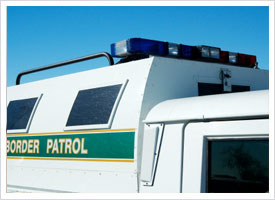Border Patrol agents serve on the ground, in the air and on the water while monitoring activities along the borders of the United States. Tasked with preventing the unlawful entry of terrorists, criminals, smugglers and illegal aliens, Border Patrol agents engage in a wide array of law enforcement, investigative, surveillance and intelligence roles. As members of the Department of Homeland Security and the country’s largest law enforcement agency, U.S. Customs and Border Protection (US CBP), Border Patrol agents serve a critical role in defending the United States.
Border Patrol agents man and operate border crossing stations, ensuring that vehicles, personnel and materials crossing at those points are authorized. Border Patrol agents actively monitor all 6,000 miles of land borders with Canada and Mexico as well as areas of high traffic on the coastlines. The Border Patrol often collects and acts on intelligence in order to secure the nation’s borders from foreign threats.
Border Patrol Agent Job Description
In order to prevent the illegal intrusion of terrorists, smugglers, human traffickers, and undocumented aliens, Border Patrol agents utilize national intelligence networks, partnerships with local U.S. law enforcement groups, and the latest military and police technologies and practices. The Border Patrol often coordinates or supports major law enforcement operations that involve deterring and busting criminal activity like drug smuggling, terrorist interdiction or human trafficking. In an effort to prevent crime and enforce the law, Border Patrol agents are often involved in:
- Traffic checks—this may include the pursuit and detention of motorists who are suspected of being in the country illegally.
- Building searches—agents may enter and investigate structures that could house illegal activities originating abroad, involve foreign criminal networks or pose a threat to domestic security.
- City patrols—Border Patrol agents often provide support and law enforcement services in border towns where foreign nationals may seek to enter.
- Vehicle searches—The stop and search of automobiles, trucks and other conveyances to prevent the transport of contraband, dangerous materials and illegal aliens is a common function of the CBP at border crossings and along national borders.
- Intelligence and anti-smuggling functions—Agents may liaise with foreign law enforcement agencies and governments in order to identify and capture criminals or terrorists who seek to enter the U.S.
The majority of activities that Border Patrol agents engage in are focused on the detection and apprehension of terrorists, smugglers and illegal aliens through:
- Covert and technologically aided surveillance—The Border Patrol may utilize a variety of surveillance systems including sonar, infrared detection, night vision and satellite imagery to monitor activity.
- Investigations into leads—As the lead agency investigating criminal activity originating outside the U.S., Border Patrol agents may question suspects and coordinate with domestic and foreign police.
- Aircraft sightings—Agents collaborate with air defense agencies like the U.S. Air Force to monitor and prevent intrusions into U.S. air space. These efforts may utilize radar, satellites or line of sight observation.
- Tracking—Border Patrol agents often pursue illegal aliens through the wilderness along U.S. borders using traditional tools like horses, dogs and man-tracking.
Salary Potential for Border Patrol Agents
An entering Border Patrol recruit may expect between $36,000 and $46,000 in annual salary in the first year. Within three years, this may rise to as high as $70,000 in annual salary. Border Patrol agents may receive bonuses of 10 to 25 percent in salary due to overtime or shifts on Sundays or holidays. Most recruits enter with a GL-5 status, but those with GL-7 have the potential for considerably higher salaries.
GL-7 status is typically awarded to those recruits with enhanced academic credentials like a master’s degree or years of service in a law enforcement or military agency. As their careers progress Border Patrol agents may be promoted up to Grade Level 11, where annual salaries may top $88,000.
In addition to base and performance based salary, Border Patrol agents are provided with federal health insurance, life insurance and disability insurance. As federal employees, agents are also awarded four hours of leave per two weeks of employment, up to 13 days a year. After 15 years of service this can grow to 26 days of leave per year. Retirement with full benefits becomes available after 20 years of service.
To learn more about how to become a border patrol agent, click here.





